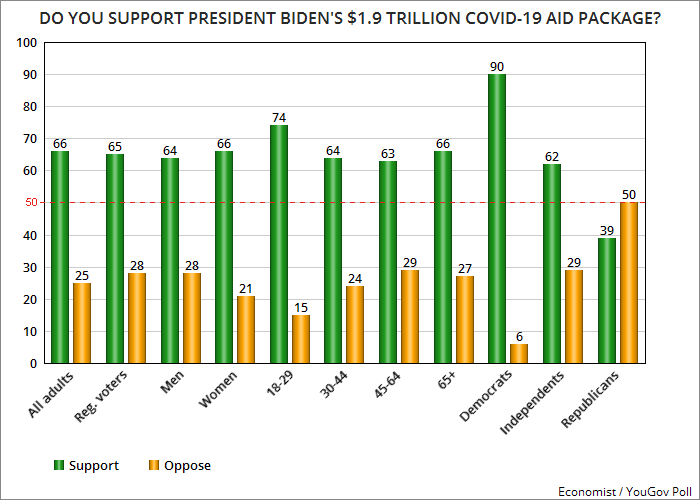The Daily Escape:

Sedona, AZ – 2021 photo by jess.kesti96
Republicans are closing ranks against Democrats’ proposed $1.9 trillion COVID-19 relief bill. Despite thin majorities in both Houses of Congress, Democrats are poised to start by pushing it through the House today.
The Senate may be another matter, as changes to the bill seem likely. Specifically, the $15/hour minimum wage may not be in the final version of the bill. And it appears that there will be little or no Republican support in either House. Not one Republican in either chamber has officially announced that they are backing the legislation.
From Politico: (Brackets by Wrongo)
“Instead, Republicans are…foisting blame on Biden for shutting them out of the legislative process and hammering Democrats over the slow pace of school reopenings across the country — an issue they think will become a potent political weapon, particularly in key suburban battlegrounds….On Tuesday, Senate GOP leaders devoted most of their weekly press conference to the school reopening debate. [Sen. John] Thune said Democrats seem more interested in money for Planned Parenthood “than they are about getting kids back into class,” while Sen. John Barrasso said Biden “has surrendered to the teachers’ union.”
Voting against the relief bill is a unity test for the GOP following their bitter infighting after the Capitol riots and last month’s impeachment vote. But Republicans are playing a dangerous game. The pandemic has killed over a half-million people and damaged the economy by throwing millions out of work. And people like the bill, although the Republicans oppose it.
In this case, while the bill is controversial in Washington, there is little disagreement about it anywhere else in the country. In fact, a substantial majority support the bill: 66% of adults and 65% of registered voters. The chart below is from a new Economist /YouGov Poll, conducted between February 19 and 22 of 1,500 adults (including 1,201 registered voters). The margin of error for adults is 2.7 points, and for registered voters is 3 points:

The data say that the bill is consistently popular across all age and gender groups, with only a plurality of Republicans objecting to it. A Quinnipiac poll similarly found that 68% support the rescue package, and 78 % support its $1,400 relief checks.
The Republicans have tried to discredit the bill, but their efforts haven’t been effective. They’ve complained about the overall size of the stimulus, and that too many people will be helped. They’re against assistance to state and local governments, saying that most of it may go to cities and states where there are lots of Democrats. But little in their arguments seems to be persuading many voters.
In fact, the bill is one of the more popular pieces of major legislation in recent US history. That demonstrates how small the risk is for Democrats, even if they get zero Republican votes for the aid package in either the Senate or the House.
To its eternal credit, the Biden administration has made it plain that it will go it alone if needs be. So far, it has waved off half-measures like the alternative proposal on the minimum wage proposed by Republican Sens. Mitt Romney and Tom Cotton.
To be passed under the reconciliation process by the Senate, the minimum wage increase would have had to survive a ruling by the Senate parliamentarian that it complies with the Byrd Rule. That rule requires that each part of the bill must produce a significant effect on federal spending, revenues, and the debt within 10 years. However, the Senate parliamentarian ruled Thursday evening that the provision to increase the minimum wage to $15/hour cannot be included in the broader relief bill.
Now, it’s likely that any increase in the minimum wage will need bipartisan support, since it can’t be passed with a simple Senate majority that Democrats are planning to use for the stimulus bill.
Even without the minimum wage, Republicans are betting that the voters won’t punish them in the 2022 mid-term election for opposing it. They may be wrong, especially if Republicans in the Senate can either block the bill, or substantially reduce its benefits.
They could also turn out to be right if the Biden administration mis-handles the roll-out of stimulus funds. But voters have long memories if you try to take money out of their pockets.
It’s vital for Biden & Co. to show Americans early on that it’s possible for them to get what they voted for. While there are many things on Biden’s agenda that will require compromise, they should push this one through.
COVID-19 relief is controversial in Washington. Everyone knows that the Republicans aren’t objecting to relief, they’re objecting to this Democratic administration getting off to a successful start.

We don’t have the structures needed to dole out aid properly. By rights, we should have effective data on who is out of work and what they earn (we have quarterly social security data fro example) but we can’t use it. We should be able to combine employment status (state) with federal data (wages) and be able to deliver aid with precision but we have spent so much effort to make aid difficult (state specific) that state data is unusable.
The $15 dollar minimum is also a non starter. In states that have no law or a lower threshhold than the federal limit, a $10 minimum will be hard enough to pass.